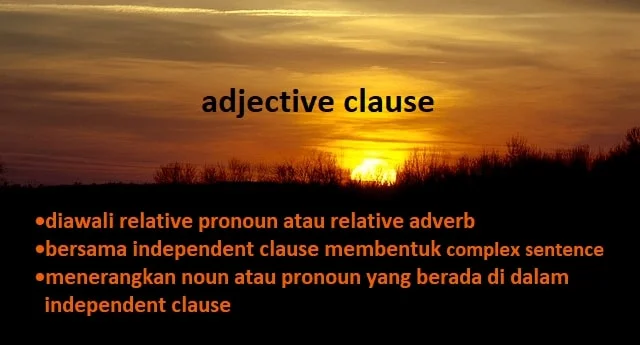Pengertian dan Rumus Adjective Clause
Adjective clause atau relative clause adalah dependent clause yang berperan sebagai adjective (kata sifat) yang menerangkan noun (kata benda) atau pronoun (kata ganti) pada main clause suatu complex sentence (kalimat yang terdiri dari independent clause dan satu atau lebih dependent clause).
Table of Contents: |

contoh kalimat adjective clause dan artinya
Lihat juga:
Rumus Complex Sentence
| main clause (independent clause) + adjective clause |
|---|
Adjective clause dibentuk dengan suatu kata yang disebut relative pronoun. Relative pronoun terdiri dari:
- who
- whom
- whose
- which
- that
- indefinite relative pronoun dengan suffix -ever: whoever, whomever, dan whichever
Selain dengan relative pronoun, adjective clause dapat pula dibentuk dengan relative adverb. Kata keterangan ini ada tiga, yaitu:
- where
- when
- why
Adjective clause dengan where untuk menerangkan noun yang menyatakan tempat, dengan when untuk menerangkan noun yang menyatakan waktu, dan dengan why untuk menerangkan noun yang menyatakan alasan.
Rumus Adjective Clause
| relative pronoun +/- S* + V |
|---|
| relative adverb + S + V |
|---|
*Relative pronoun (who, which, that) dapat berfungsi sebagai subject jika tidak ada subject.
Posisi adjective clause selalu mengikuti noun atau pronoun yang diterangkannya. Noun atau pronoun tersebut di dalam main clause berfungsi sebagai subject, object, atau subject complement.
| Situasi | Posisi Adjective Clause |
|---|---|
| Adjective clause menerangkan subject. | S + adjective clause + verb +/- object +/- modifier |
| Adjective clause menerangkan object. | S + verb + object + adjective clause |
| Adjective clause menerangkan subject complement. | S + linking verb + subject complement + adjective clause |

fungsi adjective clause
Contoh Kalimat Adjective Clause
- The book is interesting.
(Buku tersebut menarik.) simple sentence - The book that he just read is interesting.
(Buku yang baru dia baca itu menarik.) menerangkan subject “book” - I like the book that he just read.
(Saya suka buku yang baru dia baca.) menerangkan object “book” - This is the book that he just read.
(Ini buku yang baru dia baca.) menerangkan subject complement “book”
Fungsi Relative Pronoun pada Adjective Clause
Di dalam adjective clause suatu relative pronoun berfungsi sebagai subject, object, atau possessive.
-
Subject
Relative pronoun yang dapat berfungsi sebagai subjek antara lain: who, that, dan which.
Contoh Adjective Clause
that is made of wood
(yang terbuat dari kayu)Pembuktian:
coba substitusi dengan “It” (subjective personal pronoun)
-
Object
Relative pronoun yang dapat berfungsi sebagai objek antara lain: whom, that, who, dan which. Kata ini dapat dihilangkan pada defining adjective clause pada informal English.
Contoh Adjective Clause
which I wish to buy
(yang saya ingin beli)Pembuktian:
coba substitusi dengan “it” (objective personal pronoun)
-
Possessive
Relative pronoun yang dapat berfungsi sebagai possessive adalah whose.
Contoh Adjective Clause
whose house was struck by lightning
(yang rumahnya disambar petir)Pembuktian:
coba substitusi dengan “his” (possessive personal pronoun)
Defining dan Non-Defining Adjective Clause
Saat menerangkan subjek kalimat, posisi adjective clause akan berada di tengah kalimat. Klausa tersebut dapat diapit comma (koma) ataupun tidak, tergantung pada penting atau tidaknya informasi yang dibawanya. Informasi tersebut dinilai penting (essential) jika akan mengubah makna kalimat ketika dihilangkan. Pada situasi tersebut, koma tidak digunakan. Adjective clause yang membawa informasi penting tersebut dinamakan defining adjective clause. Sebaliknya, jika informasi tidak penting (non-essential) sehingga dapat dihilangkan tanpa mengubah makna kalimat, maka koma perlu digunakan. Klausa yang membawa informasi tidak penting tersebut dinamakan non-defining adjective clause.
Contoh Kalimat Defining dan Non-Defining Adjective Clause
- People who chew well may have healthy digestion.
(Orang-orang yang mengunyah dengan baik mungkin memilihi pencernaan yang sehat.) defining clause - Yulia, who works out three times a week, has a positive body image.
(Yulia, yang berolahraga tiga kali seminggu, memiliki cinta tubuh positif.) non-defining clause
Contoh Kalimat Adjective Clause dengan Berbagai Relative Pronoun / Relative Adverb
- He is the man who works hard to support their daily needs.
(Dia pria yang bekerja keras untuk menanggung kebutuhan sehari-hari mereka.)
menerangkan “man” (subject complement) - The woman whom you saw last night is my sister.
(Wanita yang kamu lihat tadi malam adalah saudara saya.)
menerangkan “woman” (subject) - The man, whose car had a flat tire, works as an English Teacher.
(The man yang ban mobilnya kempes bekerja sebagai guru bahasa Inggris.)
menerangkan “man” (subject) - Tom, which is very cute, is my cat.
(Tom, yang sangat manis, adalah kucing saya.)
menerangkan “Tom” (subject) - It is the car that I really like.
(Ini mobil yang saya sangat sukai.)
menerangkan “car” (subject complement) - Bandar Lampung is a city where I was born.
(Bandar Lampung adalah kota dimana saya dilahirkan.)
menerangkan “city” (subject complement) - I still remember the day when we first met.
(Saya masih ingat hari ketika kita pertama bertemu.) menerangkan “day” (object) - This pie chart shows the main reasons why customers leave your company.
(Bagan pai ini menunjukkan alasan utama mengapa pelanggan meninggalkan perusahaanmu.) menerangkan “reason” (object)
Relative Clause: Preposition di Depan Relative Pronoun?
Posisi Preposition terhadap Relative Pronoun di dalam Relative Clause
Whom, who, dan which ketika berfungsi sebagai relative pronoun (juga bisa sebagai interrogative pronoun) kadang-kadang berada di dalam relative clause yang verb-nya terhubung dengan preposition (seperti: at, with, for, dan about). Pada situasi itu, ketiga relative pronoun tersebut berperan sebagai object of preposition.
Ketika bertugas sebagai subject atau object of verb, relative pronoun tersebut berada di depan, mengawali suatu relative clause. Yang menjadi perdebatan adalah apakah relative pronoun tetap berada di depan atau preposition ditaruh di depannya ketika pronoun tersebut bertugas sebagai object of preposition.
Pada formal English, preposition dapat berada di depan relative pronoun. Pada situasi ini whom atau which dapat digunakan. Namun pada informal spoken English, preposition lebih umum berada di ujung (atau di dekat ujung) relative clause. Whom merupakan relative pronoun yang terlalu formal untuk informal spoken English sehingga sering digantikan who. Bahkan pada defining relative clause, yang memang spoken English biasa menggunakannya, relative pronoun dapat dihilangkan.
Contoh Kalimat Relative Pronoun dan Preposition dan Artinya
Defining Relative Clause
- The man to whom I talked has helped me so much.
(Laki-laki yang berbicara dengan saya telah banyak membantu saya.) formal - The man I talked to has helped me so much. informal
- This is white brined cheese with which Bulgarians may eat french fries.
(Ini keju putih asin yang orang Bulgaria mungkin makan kentang goreng dengannya.) formal - This is white brined cheese Bulgarians may eat french fries with. informal
- This is white brined cheese that Bulgarians may eat french fries with. informal
Non-Defining Relative Clause
- The beach, which I looked for seashells on, is having big waves.
(Pantai, yang di sana saya mencari kerang, sedang bergelombang besar.) informal - The Human Resources manager, from whom I learned about the importance of planning, was very kind.
(Human Resources manager, yang darinya saya belajar tentang pentingnya perencanaan, sangat baik.) formal - The Human Resources manager, who I learned from about the importance of planning, was very kind. informal
10 Contoh Soal Adjective Clause
Adjective clause atau relative clause merupakan subordinate clause yang berfungsi sebagai adjective dan menjelaskan noun atau pronoun pada main clause suatu complex sentence. Noun atau pronoun tersebut di dalam main clause dapat berfungsi sebagai subject, object, atau subject complement.
Adjective clause diawali oleh relative pronoun (who(ever), whom(ever), that, which, whom(ever), whose) atau relative adverb (where, when, why).

rumus adjective clause
Pilihlah relative pronoun atau relative adverb yang menurutmu paling tepat untuk melengkapi bagian yang kosong dengan mengetik a, b, atau c.
-
The university … I earned my Bachelor’s degree has built a new bussiness school building.
- which
- where
- that
Your answer:
-
I’d like to teach the children … were with us last weekend about forgiveness.
- who
- whom
- which
Your answer:
-
Someone sent her a letter, … made her smile all day long.
- whom
- which
- that
Your answer:
-
The little girl … is running down the hill is my neighbor’s daughter.
- whom
- who
- which
Your answer:
-
The homeless was sleeping on the sidewalk, … was dirty and smell very bad.
- that
- which
- where
Your answer:
-
Today is the day … most people in Indonesia get the day off.
- that
- which
- when
Your answer:
-
The Bogor Palace, … was rebuilt in 1856, is one of Indonesia’s Presidential Palaces.
- which
- that
- who
Your answer:
-
The movie … they watched was very interesting.
- whose
- whom
- that
Your answer:
-
The student, … IQ is higher that Albert Einstein, loves to learn foreign languages.
- who
- whose
- that
Your answer:
-
It was my classmate … hit the tennis ball over the net.
- which
- that
- whom
Your answer:
Javascript diperlukan untuk menjalankan quiz ini.
Lihat juga:
Lihat juga:
- Reduced Adjective Clause: Penjelasan dan Contoh
- Indefinite Relative Pronoun: Pengertian dan Contoh Kalimat
- Defining/Non-Defining Relative Clause: Pengertian dan Contoh
- Who / Whom (Relative Pronoun): Pengertian dan Contoh Kalimat
- Relative Pronoun: Pengertian, Contoh Kalimat, dan Soal
References:
- Adjective Clauses. http://faculty.deanza.edu/flemingjohn/stories/storyReader$20. Accessed on September 30, 2012.
- Kinds of Sentences and Their Punctuation. http://www.towson.edu/ows/sentences.htm. Accessed on September 30, 2012.
- When a Relative Pronoun is Used as a Subject of an Adjective Clause. http://writing.wisc.edu/Handbook/SubjectVerb.html#relative. Accessed on October 5, 2012.
- Defining Clauses. http://owl.english.purdue.edu/owl/resource/645/01/. Accessed on November 5, 2012.
- Adjective Clauses 1. http://web2.uvcs.uvic.ca/elc/studyzone/410/grammar/adj1.htm. Accessed on November 6, 2013.
- Practice: Adjective Clauses. http://wps.ablongman.com/long_faigley_penguinhb_2/30/7853/2010392.cw/. Accessed on November 6, 2013.
- Relative Clause Quiz. http://esl.about.com/library/quiz/bl_relative1.htm. Accessed on November 6, 2013.
- Adjective Clauses. http://faculty.deanza.edu/flemingjohn/stories/storyReader$20. Accessed on September 30, 2012.
- Kinds of Sentences and Their Punctuation. http://www.towson.edu/ows/sentences.htm. Accessed on September 30, 2012.
- How to Use a Relative Clause. https://www.thoughtco.com/how-to-use-a-relative-clause-1210682. Accessed on October 31, 2020.
- Grammar myths #1: is it wrong to end a sentence with a preposition? http://blog.oxforddictionaries.com/2011/11/grammar-myths-prepositions/. Accessed on August 27, 2014.
- Who and Whom. http://grammar.about.com/od/words/a/whogloss.htm. Accessed on August 27, 2014.
- Non-Errors. http://public.wsu.edu/~brians/errors/nonerrors.html. Accessed on August 27, 2014.
Alhamdulillah,semoga mendapatkan nilai yang baik dan ilmunya bermanfaat:)
Alhamdulillah
Apa itu linking verb?
Maaf banget Vania baru balas. Informasinya tentang linking verb bisa dilihat disini ya: https://www.wordsmile.com/pengertian-contoh-kalimat-linking-verbs